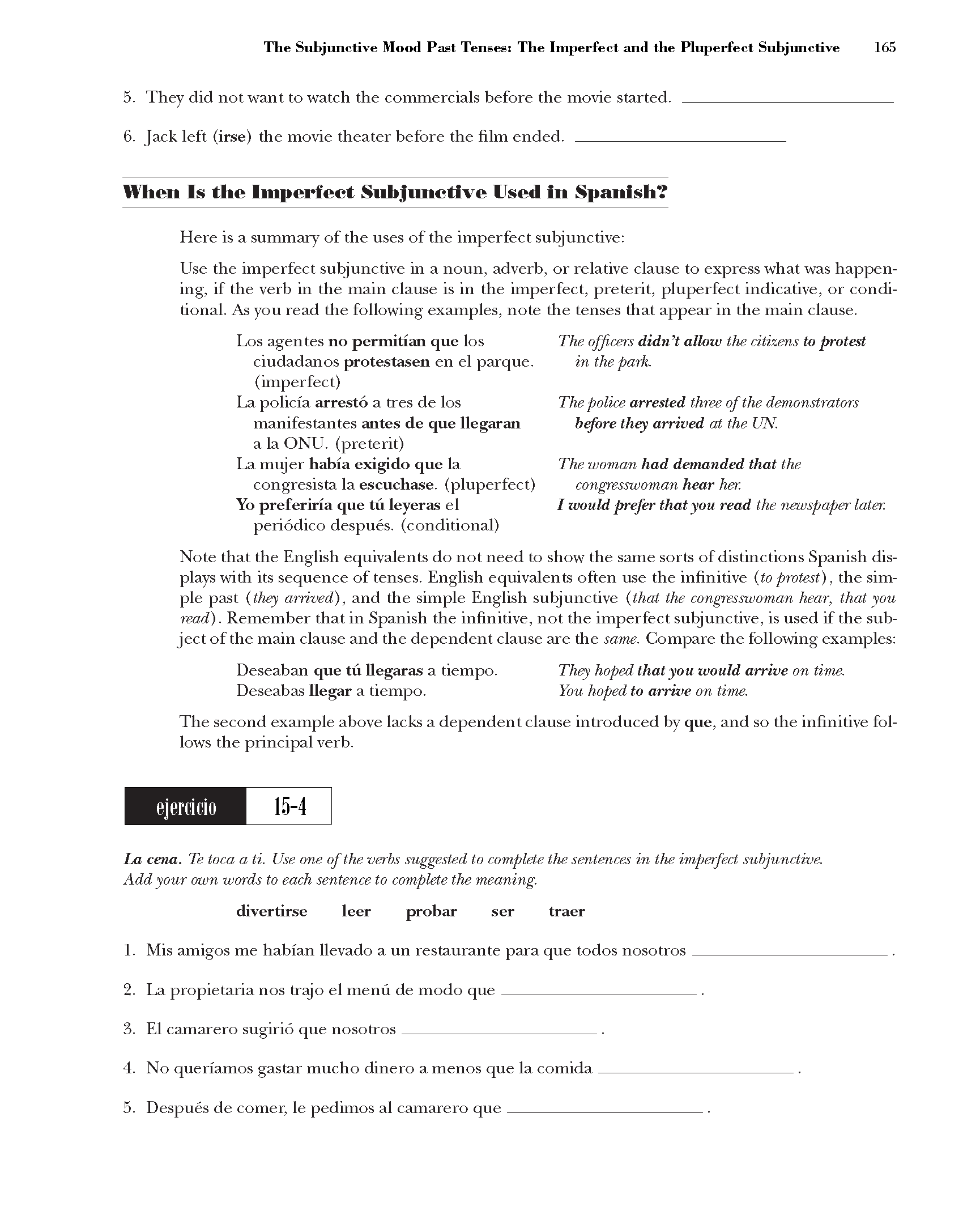CSG176

The Subjunctive Mood Past Tenses: The Imperfect and the Pluperfect Subjunctive 165
5. They did not want to watch the commercials before the movie started.
6. Jack left (irse) the movie theater before the film ended. _
Wlieii Is the Imperfect Subjimctive Used in Spanisli?
Here is a summary of the uses of the imperfect subjunctive:
Use the imperfect subjunctive in a noun, adverb, or relative clause to express what was happening, if the verb in the main clause is in the imperfect, preterit, pluperfect indicative, or condi-tional. As you read the following examples, notę the tenses that appear in the main clause.
Los agentes no permitian que los
ciudadanos protestasen en el parque. (imperfect)
La policia arrestó a tres de los
manifestantes antes de que llegaran a la ONU. (preterit)
La mujer habia exigido que la
congresista la escuchase. (pluperfect) Yo preferiria que tu leyeras el periódico despues. (conditional)
The officers didiTt alloiu the citizens to protest in the park.
The police arrested three of the demonstrators before they arrived at the UN.
The woman had demanded that the
congresswoman hear her.
I would prefer that you read the newspaper later.
Notę that the English equivalents do not need to show the same sorts of distinctions Spanish dis-plays with its sequence of tenses. English equivalents often use the infinitive {to protest), the sim-ple past (they arrrued), and the simple English subjunctive (that the congresswoman hear, that you read). Remember that in Spanish the infinitive, not the imperfect subjunctive, is used if the sub-jectof the main clause and the dependent clause are the same. Compare the following examples:
Deseaban que tu Ile gar as a tiempo. They hoped that you would arrive on time.
Deseabas llegar a tiempo. You hoped to arrive on time.
The second example above lacks a dependent clause introduced by que, and so the infinitive fol-lows the principal verb.
ejercicio
La cena. Te toca a ti. Use one of the verbs suggested to complete the sentences in the imperfect subjunctwe. Add your own words to each sentence to complete the meaning.
divertirse leer probar ser traer
1. Mis amigos me habian llevado a un restaurante para que todos nosotros_
2. La propietaria nos trajo el menu de modo que__
3. El camarero sugirió que nosotros__
4. No querfamos gastar mucho dinero a menos que la comida__
5. Despues de comer, le pedimos al camarero que__
Wyszukiwarka
Podobne podstrony:
CSG182 171 The Subjunctive Mood Past Tenses: The Imperfect and the Pluperfect Subjunctive •
CSG184 173 The Subjunctive Mood Past Tenses: The Imperfect and the Pluperfect Subjunctive In real an
CSG174 163 The Subjunctive Mood Past Tenses: The Imperfect and the Pluperfect SubjunctiveThe Imperfe
CSG178 167 The Subjunctive Mood Past Tenses: The Imperfect and the Pluperfect SubjunctiveOther Uses
CSG180 The Subjunctive Mood Past Tenses: The Imperfect and the Pluperfect
CSG182 171 The Subjunctive Mood Past Tenses: The Imperfect and the Pluperfect Subjunctive •
CSG184 173 The Subjunctive Mood Past Tenses: The Imperfect and the Pluperfect Subjunctive In real an
CSG173 Unit 15The 8ubjunotive Mood Past Tenses:The Imperfect and the Pluperfect Snbjnnctive Before l
CSG046 Unit 4The Preterit TenseRegular Verbs in the Preterit The preterit (el preterito) is one of s
File0014 I can tell a short stery osiny past ttnses. 2 1 $1.16 Read and liste
057 8 Nom©________ SkiU: Cut and past© 8« Cut out and pastę the triangles onto the matching
Conseryation ethic: it is good, a social duty, to preserve the past (Lipę 1977; Lowenthal and
więcej podobnych podstron